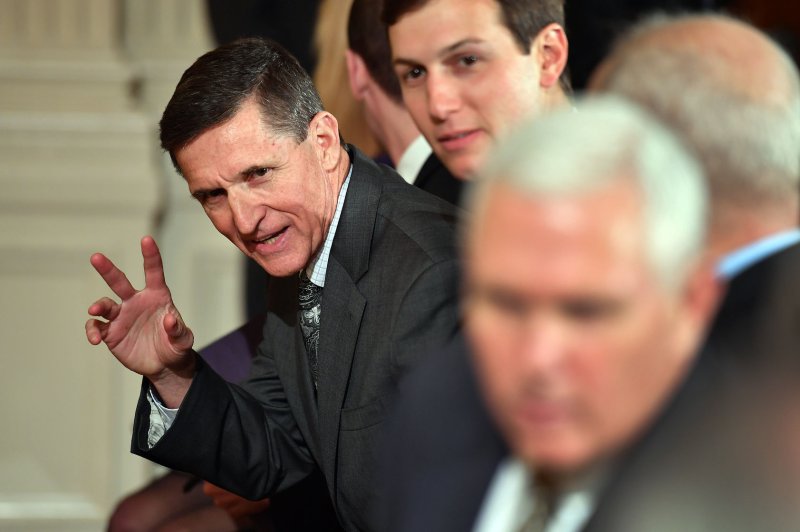National security adviser Michael Flynn resigned from the White House over a telephone call he had with Russia's ambassador to the United States in December -- weeks before Trump's administration took office -- that may have included discussion of sanctions against Russia imposed by the Obama administration. Photo by Kevin Dietsch/UPI |
License Photo
Feb. 13 (UPI) -- National security adviser Michael T. Flynn resigned from the Trump administration late Monday, for having discussions with Russia's ambassador and then misleading Vice President Mike Pence about it.
Flynn tendered his resignation to President Donald Trump Monday night after reports that the Justice Department had warned the administration about potential Russian blackmail gave way to speculation that the retired three-star general may have violated federal law.
In a resignation letter forwarded to the media by the White House, Flynn said he made numerous calls to Russian diplomat Sergey I. Kislyak and other foreign counterparts as part of working for the president's transition team, all part of standard practice for incoming administrations.
Flynn, though, may have discussed policy matters and potential sanctions from the Obama administration with the Russian ambassador -- topics he later told Pence were not talked about.
"Unfortunately, because of the fast pace of events, I inadvertently briefed the vice president elect and others with incomplete information regarding my phone calls with the Russian ambassador," Flynn, 58, wrote in the letter. "I have sincerely apologized to the president and the vice president, and they have accepted my apology."
Trump named Lt. Gen. Joseph Keith Kellogg, chief of staff for the National Security Council, as acting national security adviser while the administration searches for Flynn's replacement.
Several top aides had been pushing Trump for days to replace Flynn and have been searching for candidates. Retired Gen. David Petraeus is scheduled to meet with the president on Tuesday and a list of others is being prepared for the president's consideration.
Obama imposed punitive sanctions against Russia on Dec. 29, three weeks before he left office.
Russian President Vladimir Putin said at the time he would not retaliate against the new sanctions. Some experts now wonder whether Moscow's muted response might have stemmed from Flynn informing Kislyak that the Trump White House would be open to lifting the punitive restrictions once he took office.
U.S. intelligence officials, searching for an explanation for Moscow's uncontested acceptance of new sanctions, subsequently came across Kislyak's phone call with Flynn.
Trump's administration previously denied Flynn had discussed sanctions with Kislyak. Last month, Spicer said Flynn sent Kislyak holiday greetings on Christmas Day -- and on Dec. 28, as word of Obama's pending sanctions spread, the ambassador asked for a phone call with Flynn.
Last week, the national security adviser denied discussing sanctions with Kislyak, but his spokesman said a day later that Flynn said he actually "couldn't be certain that the topic never came up."
Officials and experts say such a disclosure with an adversary of the United States is a remarkable breach of security protocol and a potential violation of the Logan Act, which bars civilians from negotiating with foreign governments.
Kislyak's phone conversation, which was monitored and recorded as a matter of standard FBI procedure, was being investigated by counterintelligence officials.
Trump adviser Kellyanne Conway told MSNBC earlier Monday that Flynn still had the "full confidence" of the president.
Earlier this month, the Treasury's Office of Foreign Assets Control amended Obama's sanctions to allow U.S. sales of tech products to the Russian Federal Security Service, or FSB, as long as they aren't used in the Crimean Peninsula and don't violate existing sanctions.
U.S. intelligence said last year that the FSB, Russia's successor to the Soviet-era KGB, had been involved in attempts to sway the election -- which is why Obama barred American tech companies from exporting cyber tools to the agency.
The White House said at the time that amending the sanctions isn't the same thing as lifting them.
"We're not easing," Trump spokesman Sean Spicer said. "From what I understand, [it is] a regular course of action."
The retired three-star lieutenant general is also under fire for a trip to Moscow he made in 2015 -- during which he sat next to Putin at a banquet celebrating a state-run television network. Army investigators are trying to determine whether Flynn received any compensation from the Russian government, which could be a violation of the emoluments clause of the U.S. Constitution.
The clause prohibits any person "holding any office of profit or trust" in the federal government from accepting any gift, emolument, office, or title of any kind from any king, prince, or foreign state without the consent of Congress.
The Washington Post reported Monday that the Justice Department had warned Trump's White House that Flynn's phone conversation with Kislyak could put the National Security Council chief in a compromising position -- and perhaps even susceptible to Russian blackmail.
The Post also reported that Kislyak confirmed he'd communicated with Flynn before Trump's inauguration, but did not say whether sanctions or other policy matters were discussed.
Andrew V. Pestano contributed to this report















